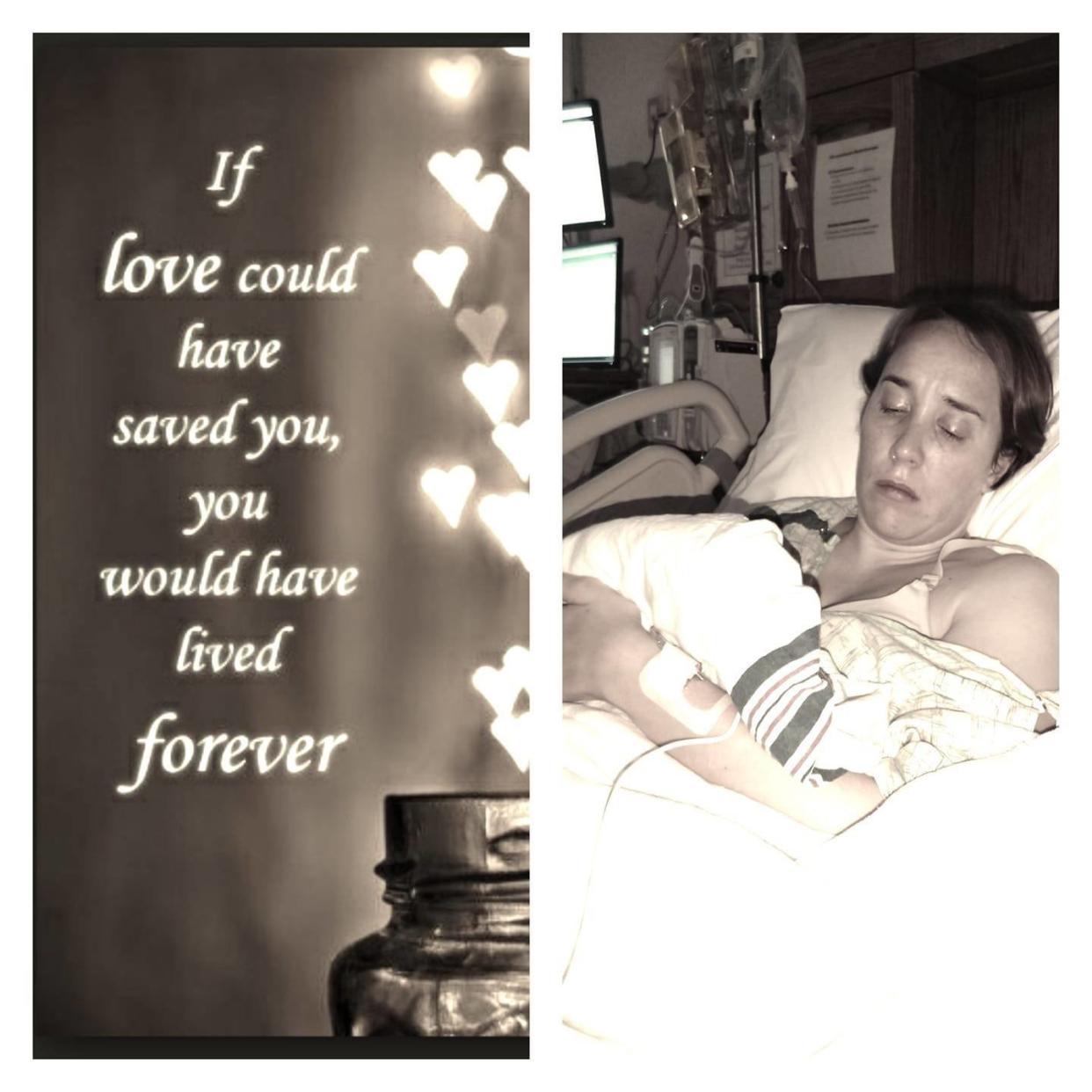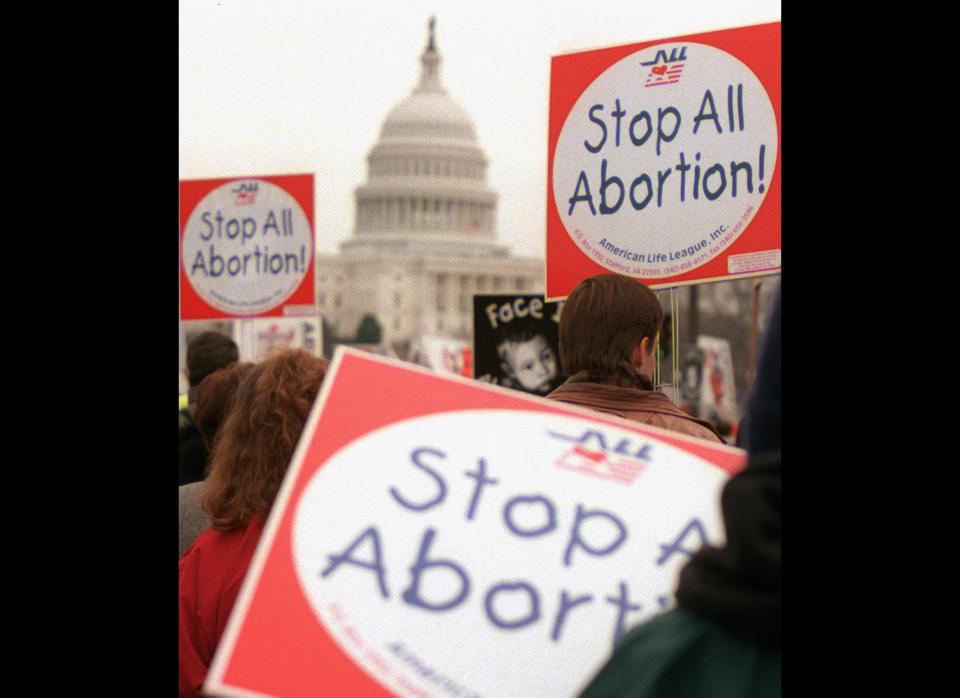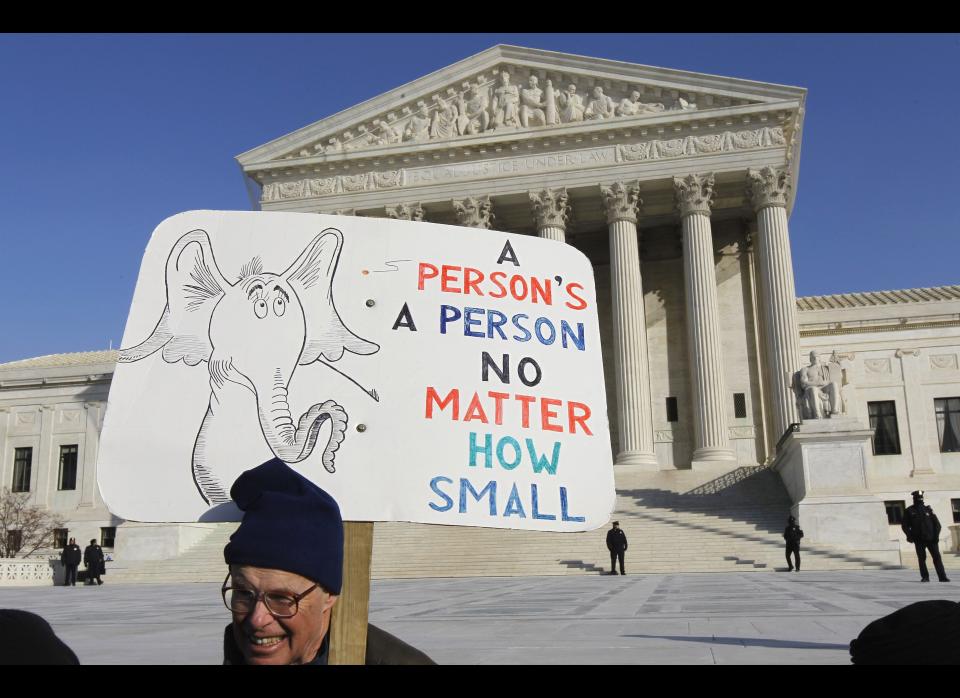How The Federal Ban On Abortion Funding Hurts Military Families

Rose Penchansky was on the fence about whether to say something.
She was on her computer, scrolling through a closed Facebook fan group for the Hulu show “The Handmaid’s Tale” shortly after the midterm elections and came across a post about the news that Alabama’s voters had just passed an amendment giving “unborn children” the “right to life in all manners and measures appropriate and lawful.” It reiterated the fact that the state doesn’t protect abortion rights or fund the procedure ― something that could set the stage for abortion to become illegal in Alabama if Roe v. Wade is overturned by the Supreme Court.
Penchansky, 33, watched members of the group debate about which abortions should be legal and which shouldn’t. But after reading one too many strident posts about how abortions should be illegal or illegal after the first trimester, she knew she had to speak up about her second-trimester abortion, scheduled for just a few days later.
“They did an in-depth ultrasound and discovered the baby had hydrops fetalis, pleural effusions, edema and cystic hygroma, and increased risk of Down’s Syndrome and Turner’s Syndrome,” she wrote. “They did emergency amniocentesis. All of that was the easy part.”
“I decided to terminate, my husband agreed,” she continued. This is where it became difficult.”
Penchansky lives in Tennessee, and if she had had health insurance through her employer, she likely would have had coverage for the abortion. But because her husband is in the military, she instead gets her health care through Tricare Prime, the military’s health management organization for family members of military personnel.
And because of a federal law that bans the use of federal funds for abortions for fetal anomalies, the second-trimester termination cost nearly $16,000 out of pocket ― something her family couldn’t afford. Penchansky has turned to crowdfunding in order to meet the costs.
“When the government starts taking a woman’s right away and dictating how they can use their body, so begins the slippery slope into Gilead,” Penchansky wrote, referring to the name of the “Handmaid’s Tale” society that enslaves fertile women. “This is happening to me right now.”
A federal ban on abortion funding affects millions of Americans
The federal government has banned the use of federal funds for abortions since 1976, under what is known as the Hyde Amendment. It blocks states from using federal funds from Medicaid, Medicare or Children’s Health Insurance programs to pay for abortions except in two instances: when a woman’s life is in danger and when the pregnancy results from rape or incest.
This amendment has been used as the basis for more laws that prevent federal funding for abortion, said the Guttmacher Institute, a reproductive rights advocacy organization. This includes laws that prevent the military from paying for abortions for fetal anomalies and extend to anyone employed by the federal government, anyone who gets health care through Veterans Affairs or the Indian Health Service and people in federal prisons or immigration detention centers.
These abortion restrictions affect millions of lives, Guttmacher notes. Tricare covers more than 9 million military members and their dependents, and the Federal Employee Health Benefits program for civilian federal employees covers more than 8 million people and their dependents.
Because Penchansky was young and healthy and had a previous uncomplicated pregnancy and birth, she didn’t qualify for first-trimester screening tests covered by Tricare. It wasn’t until she was 17 weeks along in her pregnancy that she received the results of her first fetal screening of any kind: the quad screen, a blood test that can detect signs of chromosomal abnormalities in the fetus, as well as some conditions in which the brain and spinal column don’t develop properly.
The results weren’t good. It showed that her baby had an increased risk of chromosomal abnormalities and that she needed to see a specialist right away. But there was added urgency for her. Because she got her health care through the military, which doesn’t cover abortions for fetal abnormality, the longer she waited, the more expensive a termination would be.
She moved as fast as she could. A week later, an in-depth ultrasound with a maternal-fetal medicine specialist revealed that half her baby girl’s heart hadn’t developed, she had a large fluid-filled cyst running from her head all the way down her spine and there were large accumulations of fluid in the chest cavity affecting both lungs.
“I pretty much had a mental breakdown in the office,” Penchansky told HuffPost. “My son was with me, and I was really losing it.”
Still, she held on to hope for her daughter that the amniocentesis, a test that can diagnose abnormalities or birth defects, would have promising news.
“I told [the doctor] I wouldn’t terminate unless I knew what was wrong with the baby,” she said. “I didn’t want to just base it off of an ultrasound.”
The results came back at week 20. Her baby was diagnosed with Turner syndrome, which the doctor had suspected because of the large spinal cysts and accumulation of fluid in her body. The chromosomal disorder, in which a female fetus has only one X chromosome instead of two, results in miscarriage 99 percent of the time.
The doctor talked to Penchansky about the “lethal nature” of the combination of the baby’s Turner syndrome, half-formed heart and growing cysts, according to a medical record of the appointment.
She decided to end the pregnancy as soon as possible rather than prolong the baby’s suffering or expose herself to the risk of delivering of a full-term baby with extremely large cystic growths.
“I don’t want to bring a baby into the world that has a 1 percent chance of making it,” she said. “I’m either going to watch her pass away early on, or she’s going to suffer.”
An abortion that far along is an anomaly in the U.S. Only about 1.3 percent of abortions performed in this country happen after 21 weeks gestation.
How abortion restrictions make a tragic situation stressful
The federal restrictions on abortions for fetal anomalies, in combination with state laws that continue to close abortion clinics or make the window of legal abortion smaller, mean more pressure on women and their families in what are already difficult circumstances.
Dr. Neil Silverman, a clinical professor of obstetrics and gynecology at the University of California, Los Angeles, wasn’t involved in Penchansky’s case but reviewed her anonymized medical records.
He said that women like her are dealt a severe blow when they receive news about fatal fetal anomalies and that the situation is made worse by the “external forces” like gestational age cutoffs for abortions, restrictions on medical counseling and waiting periods for abortion that encroach on discussions between patients and doctors.
“I feel strongly that what I might do personally is not what any given woman or family might do, and counseling needs to be able to take all options into consideration, not just pregnancy termination,” said Silverman, who specializes in high-risk pregnancies. “That said, termination can’t be limited by external forces from the critical patient-physician discussion.”
Penchansky agreed. She said the lack of health insurance coverage for the procedure turned an already trying and difficult period of life for her into something stressful and expensive too.
After deciding to terminate, she listened to her baby’s heartbeat with a Doppler fetal monitor every day, but now with the hope that the baby inside her would die before her scheduled abortion.
“If I can’t find a heartbeat, I can go down to labor and delivery on the Army base,” she explained. “They can check, confirm, and then [I] wind up with the dilation and evacuation on the Army base ― and Tricare will pay for it.”
That didn’t end up happening.
Instead, she went through with the abortion ― an induced birth, because she was so far along and the baby’s heart was still beating ― on Nov 15. But by the time she gave birth, the baby no longer had a heartbeat.
“My body thinks I have a baby to feed, my belly is still swollen, and I have typical bleeding,” wrote Penchansky in an email to HuffPost a few days after the procedure. “I have moments where I keep busy and don’t think about it, and moments where something triggers me and I break down.”
But in addition to grieving the loss of their very much wanted baby girl, she keeps ruminating on the cost of the abortion.
Penchansky said she believes that if she could have had a screening test like a nuchal translucency scan in the first trimester, the problems would have been caught sooner ― and she could have easily afforded a $1,000 first trimester abortion at a local Planned Parenthood. In the end, her parents ended up lending her $10,000 for the second-trimester abortion.
Silverman said that it was difficult to say at this point whether the baby’s issues would have been visible in a first-trimester ultrasound but that it was possible.
“It’s very likely that with a large fluid collection like a cystic hygroma seen in the second trimester, that the nuchal translucency typically measured on ultrasound in the first trimester as a screening test might have been enlarged as well,” he said. This would have then triggered more diagnostic testing like chorionic villus sampling or amniocentesis earlier, which would have found the Turner syndrome faster.
Kevin Dwyer, a spokesman for Tricare, didn’t comment directly on Penchansky’s case but said that the health plan complies with federal laws banning abortion except when the mother’s life is in danger or the pregnancy resulted from rape or incest.
He also said that Tricare’s schedule for ultrasounds and other prenatal care is in line with guidelines published by the American College of Obstetricians and Gynecologists, which recommends a first-trimester ultrasound only if the mother has certain symptoms or risk factors.
Like many other military family members during deployment, Penchansky went through all this without her spouse by her side. He is stationed in Texas and didn’t go home for the termination.
They decided that together, she explained, because it took him one year to qualify for the specialized military training that he’s doing now. Instead, her sister and brother-in-law went to be with her and care for her 5-year-old son while she was in the hospital.
Her boy is old enough to know she was pregnant but too young to understand why the pregnancy ended without a baby sibling for him. In the weeks leading up to the induction, Penchansky tried explaining to him several times that the baby in her belly was very sick and that she needed to go to the hospital to take the baby out.
“I asked him if he understands, and he says ‘yes,’” she said. “But then he tells his speech therapist that we’re having a girl.”
This story has been updated to include updated financial details about Penchansky’s procedure.
HuffPost’s “Her Stories” newsletter brings you even more reporting from around the world on the important issues affecting women. Sign up for it here.
Also on HuffPost
Iowa Bill Allows The "Justifiable Use Of Deadly Force" To Protect The Unborn
![<strong>Bill Premise</strong>: Two bills have been combined into one to essentially define an unborn fetus as a person. In protecting that person, the Iowa legislature wants to allow the use of deadly force against abortion doctors or family-planning practitioners. The far-reaching consequence is that if this bill passes, persons that harm or kill abortion providers would be protected under state law from persecution. From the <a href="http://iowaindependent.com/52869/iowa-bills-open-door-for-use-of-deadly-force-to-protect-the-unborn" target="_hplink">Iowa Independent</a>: <blockquote>Also included in the proposal is a new section to the Iowa Code that would provide automatic criminal and civil immunity to a person who uses deadly force, unless a police investigation proves that the person was not acting "reasonably." Also key to the immunity clause is the fact that law enforcement would likely be barred from arresting a person at the scene of an incident "unless the law enforcement agency determines there is probable cause that the force was unlawful under this chapter." If law enforcement does make an arrest, and if that person is later found to have used reasonable force by a court of law, taxpayers could be on the hook for the reimbursement of the person's attorney fees, court costs, compensation from loss of income and other expenses. [...] "Does this provide someone who is a person with an anti-abortion stance at least an opportunity that is more likely to get to a jury? I think the answer is yes," [associate professor of law at the University of Kansas Melanie D.] Wilson said. </blockquote> <strong>Bill Status</strong>: Currently under debate.](https://s.yimg.com/ny/api/res/1.2/Y1dKNpl.V5tBXOudAswnUw--/YXBwaWQ9aGlnaGxhbmRlcjt3PTk2MA--/https://img.huffingtonpost.com/asset/5bb91662260000360083cdac.jpg)
Also included in the proposal is a new section to the Iowa Code that would provide automatic criminal and civil immunity to a person who uses deadly force, unless a police investigation proves that the person was not acting "reasonably." Also key to the immunity clause is the fact that law enforcement would likely be barred from arresting a person at the scene of an incident "unless the law enforcement agency determines there is probable cause that the force was unlawful under this chapter." If law enforcement does make an arrest, and if that person is later found to have used reasonable force by a court of law, taxpayers could be on the hook for the reimbursement of the person's attorney fees, court costs, compensation from loss of income and other expenses. [...] "Does this provide someone who is a person with an anti-abortion stance at least an opportunity that is more likely to get to a jury? I think the answer is yes," [associate professor of law at the University of Kansas Melanie D.] Wilson said.Bill Status: Currently under debate.
Nebraska's Bill Revives "Justifiable Homicide"

The legislation, LB 232, was introduced by state Sen. Mark Christensen, a devout Christian and die-hard abortion foe who is opposed to the prodedure even in the case of rape. Unlike its South Dakota counterpart, which would have allowed only a pregnant woman, her husband, her parents, or her children to commit "justifiable homicide" in defense of her fetus, the Nebraska bill would apply to any third party. "In short, this bill authorizes and protects vigilantes, and that's something that's unprecedented in our society," Melissa Grant of Planned Parenthood of the Heartland told the Nebraska legislature's judiciary committee on Wednesday. Specifically, she warned, it could be used to target Planned Parenthood's patients and personnel. Also testifying in oppostion to the bill was David Baker, the deputy chief executive officer of the Omaha police department, who said, "We share the same fears...that this could be used to incite violence against abortion providers."Bill's Status: Currently in the state legislature open for debate.
Georgia Moves To Criminalize Miscarriages

The bill...shows an astonishing lack of concern for women's health and well-being. Under Rep. Franklin's bill, HB 1, women who miscarry could become felons if they cannot prove that there was "no human involvement whatsoever in the causation" of their miscarriage. There is no clarification of what "human involvement" means, and this is hugely problematic as medical doctors do not know exactly what causes miscarriages. Miscarriages are estimated to terminate up to a quarter of all pregnancies and the Mayo Clinic says that "the actual number is probably much higher because many miscarriages occur so early in pregnancy that a woman doesn't even know she's pregnant. Most miscarriages occur because the fetus isn't developing normally."Bill's Status: Open for debate in the legislature
South Dakota's Pioneering Foray Into "Justifiable Homicide"

"The bill in South Dakota is an invitation to murder abortion providers," says Vicki Saporta, the president of the National Abortion Federation, the professional association of abortion providers. Since 1993, eight doctors have been assassinated at the hands of anti-abortion extremists, and another 17 have been the victims of murder attempts. Some of the perpetrators of those crimes have tried to use the justifiable homicide defense at their trials. "This is not an abstract bill," Saporta says. The measure could have major implications if a "misguided extremist invokes this 'self-defense' statute to justify the murder of a doctor, nurse or volunteer," the South Dakota Campaign for Healthy Families warned in a message to supporters last week.Bill's Status: Shelved.
Pennsylvania Wants to Regulate Clinics

Kansas Considering Two Laws Limiting Abortions

Virginia Cracks Down on Clinics

House Passes Planned Parenthood Defund

The vote, which passed, 240 to 185, came after an emotional, late-night speech by Rep. Jackie Speier (D-Calif.), who revealed on the House floor that she had had an abortion. Speier criticized Republicans for vilifying Planned Parenthood and abortion-rights supporters. "There is a vendetta against Planned Parenthood, and it was played out in this room tonight," she said on the House floor. "Planned Parenthood has a right to operate. Planned Parenthood has a right to provide family planning services. Planned parenthood has a right to perform abortions. Last time you checked, abortions were legal in this country."Bill's Status: Passed the House, likely to be a non-starter in the Senate.
GOP Tries to Redefine Rape

For example: If a 13-year-old girl is impregnated by a 24-year-old adult, she would no longer qualify to have Medicaid pay for an abortion. (Smith's spokesman did not respond to a call and an email requesting comment.) Given that the bill also would forbid the use of tax benefits to pay for abortions, that 13-year-old's parents wouldn't be allowed to use money from a tax-exempt health savings account (HSA) to pay for the procedure. They also wouldn't be able to deduct the cost of the abortion or the cost of any insurance that paid for it as a medical expense.And what is "forcible rape?" As it turns out, "The term 'forcible rape' actually has no set meaning; legal definitions of "force" vary widely. And every survivor who finds herself in need of abortion funding will have to submit her rape for government approval." Bill's status: After an intense outcry, lawmakers backed off of redefining rape.
South Dakota Tries Again

Love HuffPost? Become a founding member of HuffPost Plus today.
This article originally appeared on HuffPost.

